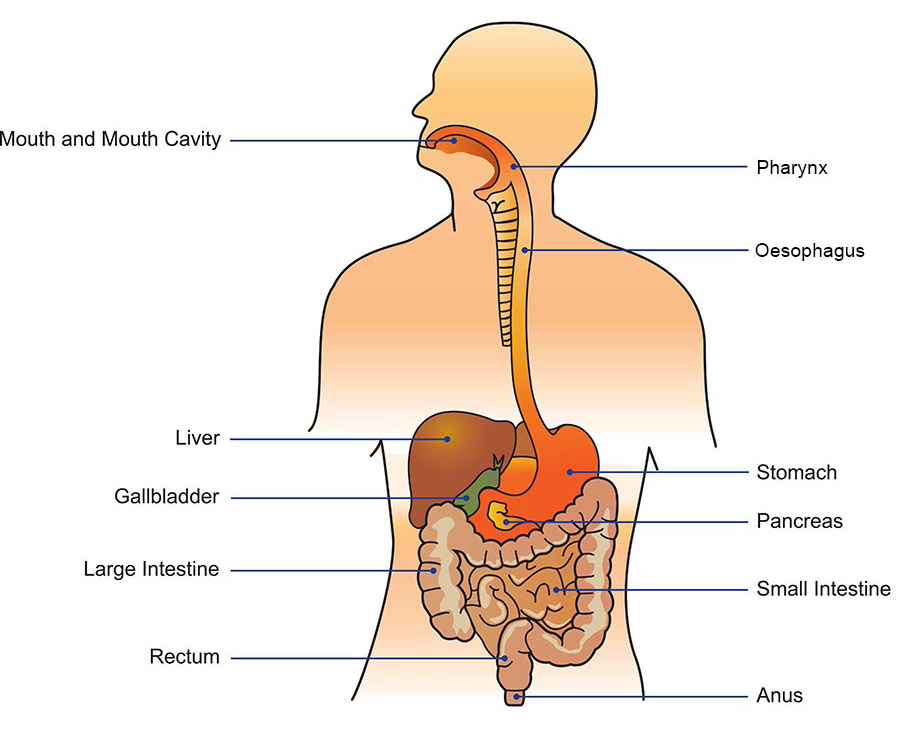
HRXT4A The human digestive system consists of the gastrointestinal tract plus the accessory organs of digestion (the tongue, salivary glands, pancreas, liver
Adelekan Oluwaseun Ojo
The digestive system uses mechanical and chemical activities to break food down into absorbable substances during its journey through the digestive system.
Digestive Processes
The processes of digestion include six activities: ingestion, propulsion, mechanical or physical digestion, chemical digestion, absorption, and defecation.
The first of these processes, INGESTION, refers to the entry of food into the alimentary canal through the mouth. There, the food is chewed and mixed with saliva, which contains enzymes that begin breaking down the carbohydrates in the food plus some lipid digestion via lingual lipase. Chewing increases the surface area of the food and allows an appropriately sized bolus to be produced.
Food leaves the mouth when the tongue and pharyngeal muscles propel it into the esophagus. This act of swallowing, the last voluntary act until defecation, is an example of PROPULSION, which refers to the movement of food through the digestive tract. It includes both the voluntary process of swallowing and the involuntary process of peristalsis. Peristalsis consists of sequential, alternating waves of contraction and relaxation of alimentary wall smooth muscles, which act to propel food along. These waves also play a role in mixing food with digestive juices. Peristalsis is so powerful that foods and liquids you swallow enter your stomach even if you are standing on your head.
Digestion includes both MECHANICAL and CHEMICAL processes. Mechanical digestion is a purely physical process that does not change the chemical nature of the food. Instead, it makes the food smaller to increase both surface area and mobility. It includes mastication, or chewing, as well as tongue movements that help break food into smaller bits and mix food with saliva. Although there may be a tendency to think that mechanical digestion is limited to the first steps of the digestive process, it occurs after the food leaves the mouth, as well. The mechanical churning of food in the stomach serves to further break it apart and expose more of its surface area to digestive juices, creating an acidic “soup” called chyme. SEGMENTATION, which occurs mainly in the small intestine, consists of localized contractions of circular muscle of the muscularis layer of the alimentary canal. These contractions isolate small sections of the intestine, moving their contents back and forth while continuously subdividing, breaking up, and mixing the contents.
By moving food back and forth in the intestinal lumen, segmentation mixes food with digestive juices and facilitates absorption.
In chemical digestion, starting in the mouth, digestive secretions break down complex food molecules into their chemical building blocks (for example, proteins into separate amino acids). These secretions vary in composition, but typically contain water, various enzymes, acids, and salts. The process is completed in the small intestine.
Food that has been broken down is of no value to the body unless it enters the bloodstream and its nutrients are put to work. This occurs through the process of ABSORPTION, which takes place primarily within the small intestine. There, most nutrients are absorbed from the lumen of the alimentary canal into the bloodstream through the epithelial cells that make up the mucosa. Lipids are absorbed into lacteals and are transported via the lymphatic vessels to the bloodstream (the subclavian veins near the heart). The details of these processes will be discussed later
In DEFECATION, the final step in digestion, undigested materials are removed from the body as feces.
In some cases, a single organ is in charge of a digestive process. For example, ingestion occurs only in the mouth and defecation only in the anus. However, most digestive processes involve the interaction of several organs and occur gradually as food moves through the alimentary canal.
What happens to the food which is not absorbed in the digestive system?
The food that is not absorbed in the digestive system passes through the gastrointestinal tract and eventually exits the body as waste. This waste material, consisting of undigested food, fiber, and other substances, is known as feces or stool.
Throughout the digestive process, the body absorbs nutrients, water, and other essential substances from the food. However, some components of the food, such as dietary fiber, remain largely undigested and reach the large intestine or colon. The colon absorbs additional water and electrolytes from the remaining material, further consolidating it into solid waste.
The undigested food and waste products then move through the colon, where beneficial bacteria in the gut help break down some of the remaining substances. The colon’s muscular contractions, known as peristalsis, propel the waste material toward the rectum.
Once the waste material reaches the rectum, it triggers the sensation of needing to have a bowel movement. The rectum temporarily stores the feces until it is voluntarily eliminated through the anal canal and out of the body during a bowel movement.
It’s worth noting that although some components of the food are not absorbed, they can still play a role in digestive health. For instance, dietary fiber helps maintain bowel regularity and supports a healthy gut environment by providing nourishment to beneficial gut bacteria.
Digestion is a complex process that involves breaking down food into smaller components that can be absorbed by the body. The length of time it takes for digestion to occur can vary widely from person to person, with some individuals requiring more time than others. In this article, we’ll explore some of the reasons why this may be the case.
Factors that Influence Digestion Time.
There are several factors that can influence the length of time it takes for food to be digested. These include:
Age: As we age, our digestive system tends to slow down. This can lead to longer digestion times, particularly for foods that are more difficult to break down.
Gender: Women tend to have longer digestion times than men. This is because women’s stomachs are smaller than men’s, and their hormonal differences can also impact digestion.
Diet: The type of food we eat can impact digestion time. Foods that are high in fiber and water content tend to move through the digestive system more quickly, while foods that are high in fat and protein take longer to digest.
Medical Conditions: Certain medical conditions can impact digestion time. For example, gastroparesis is a condition where the stomach takes too long to empty, while inflammatory bowel disease can cause inflammation in the digestive tract, slowing down digestion.
Medications: Some medications can impact digestion time. For example, opioids can slow down digestion, while certain antibiotics can speed it up.
Stress: Stress can impact digestion time by altering the function of the digestive system. Some people may experience faster digestion during times of stress, while others may experience slower digestion.
Follow 4 steps, you don’t need to worry about digestion.
1. Eat when you feel hungry.
2.Chew the food when you eat.
3. Stop eating when you get first burp.
4. Don’t drink water while eating. Also, don’t drink water 30 minutes before and after the food.
What is good for digestion?
Believe it or not, 90% of the diseases start from your intestines and the primary most important reason for that is bad digestion.
So the following are 11 easy tips to live a healthy life.
1. Eat at least 2-3 hours before sleeping. Have light food in dinner. Drink warm milk before bed if feeling hungry.
Reason : The food will get digested within this time and you will sleep light, else the body will keep struggling to digest the food while you are sleeping rather than focusing on taking rest. Moreover, most of the repairing work is done by the body while asleep. Due to which, one will sleep less and wake up fresh and energetic.
2. Don’t drink water 15 mins before meals, during meals and 45 mins after meals.
Reason : Water severely interferes with the digestion and absorption process. It will dilute the gastric juices which aids digestion ..
3. This one everyone knows but nobody implements : Chew food 32 times before swallowing.
Reason : Digestion starts right from the mouth and the more you Chew the less the stomach has to work to digest the food.
4. Eat fresh and eat raw
Reason : It’s the life that is changing form from food into you. So the more fresh and raw foods that are the full of life you eat, the more you feel alive.
5. Drink a litre of water in the morning.
Reason : it starts the entire system and clears any waste from your intestines. Starting with a glass gradually increases the quantity.
6. Observe fast once in a while
Reason : Give your stomach some rest. We keep on eating every waking hour munching something and the body works all the time to digest. So, Fasting gives rest to all the vital organs and rejuvenates the entire system. It also helps in removing the toxins out of the body.
7. Walk after every big meal.
Reason : Again if helps in taking the load off from the stomach to digest the food. Take at least 300 steps after meal. Or Sit in vajrasna as it brings the whole energy to the abdomen region where the digestion is gonna happen. You may also lie down for some time but don’t sleep during the day.
8. Don’t stuff the stomach too much.
Reason : As per Ayuveda, one should eat 1/2 of food as solid, 1/4 as liquid and one should leave 1/4th of the stomach empty as the offering to God. Basically, the empty space will make it easier for stomach to churn the food. For eg- Ever tried churning something in a mixer after over stuffing it similarly when we over stuff the body prefers to push the food out of system rather than absorbing the minerals out of food.
9. While eating just eat.
Reason : We work all day to earn food and when you actually earned it, We are again busy with talking, checking out Facebook, watching TV series, doing something stupid on mobile. Stop everything and just enjoy your delicious meal. Savor every bite, taste the flavour and feel that this is the best meal on earth.
10. Eat balanced food.
Reason : Stop listening to diet coaches and start eating everything in balance and moderation. Eat fruits, vegetables, dairy, nuts, eggs, ghee and everything under the sun to eat. And believe me you don’t have to take any pills for vitamins and minerals after that.
11. Don’t interfere with your sleeping cycle.
Reason: It badly affects the entire body and the mind. The body goes into the shock after the disturbed sleep and doesn’t know when it is gonna be fed and when it will be rested .
One Bonus Tip:
Listen to your body. It is the best dietician ever. The body knows what is right for you, just pay some attention. And eat what is good for the body not what is good for tongue.
……….…………… Adelekan Oluwaseun Ojo, is a counseling psychologist, and a business & health consultant with Jigsimur Zdex Int’l, a company which is into the production and distribution of Jigsimur herbal health drink, a natural curative and preventive herbal medicine from South Africa.





